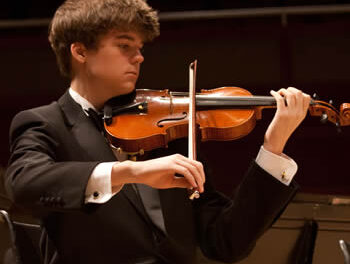The East Carolina University School of Music put several of its student ensembles on display for a full evening of seasonal music – with a repertoire ranging from the sublime to the not-so-sublime. How about “Jingle Bells” played by a symphony orchestra in the style of “Stars and Stripes Forever”?
For the second time in less than two weeks, the sanctuary of St. Paul’s Episcopal Church was packed to overflowing, and the program was such that only the Scroogiest of Scrooges would not have found something to enjoy.
The most sublime was a five-song set by the ECU Chamber Singers, fresh from their runner-up placement in the international choral festival in Tolosa, Spain, in November. Starting with “Puer Natus in Bethlehem” by Samuel Scheidt and ending with a spiritual, “Rise Up, Shepherd, and Follow,” the ensemble showed why this component of the university music program is a true jewel, not just locally but also the region as well. The Scheidt was directed by student Kyle Nielsen and sung as a double choir with two soloists. Soprano Rachel Webb stood in front of the organ console; opposite her and quite some distance away, near the altar, was tenor John Tyler McDonald; the choir split into two sections and faced each other from the side aisles. The music filled the space in a fashion somewhat different from when a choir sings in only one location; this music was close to heavenly. McDonald directed the choir in Ned Rorem’s “While All Things Were in Quiet Silence,” with its much more modern harmonies and lovely “Alleluia” section; another beautiful contemporary piece was Daniel Elder’s “Ave Maria,” which was part of the Chamber Singers’ repertoire in the Spain competition. DeMarcus Kelly sang a vibrant solo in the spiritual.
The program opened with four songs by the St. Cecilia Singers, an all-female ensemble directed by Dr. Jeffrey Ward. The vocalists entered singing Elizabeth Poston’s familiar “Jesus Christ the Apple Tree” and went right into John Jacob Niles’ arrangement of “I Wonder As I Wander.” Both were sung a cappella; the wordless soprano descant in “I Wonder” and later wordless alto accompaniment were especially fine. The young women also sang beautifully an arrangement of “Still, Still, Still” by Ron Jeffers.
The University Chorale, a larger ensemble of both music majors and non-majors, offered a fine reading of Berlioz’s “The Shepherd’s Farewell,” although the tempo for the final two verses could have slowed a bit, and the dynamics softened; and McDonald led the ensemble in a fine reading of Handel’s “And the Glory of the Lord” from Messiah, accompanied by the ECU Symphony Orchestra. Under the direction of Dr. Andrew Crane, the Chorale also sang Eric Whitacre’s “Lux Aurumque,” in which the close harmonies and suspensions were well done, especially the women’s harmonies that floated over the ensemble and audience and the incredibly long sustained note by the women at the end.
The ECU Symphony had its moments to shine and brought a little more secular element to the program. Under the direction of student Nyamsaikhan Odsuren, the orchestra gave a nice reading of Leroy Anderson’s “Christmas Festival,” a medley of eight popular carols and songs, with an ending that carried faint echoes of Saint-Saëns’ “Organ” Symphony. (St. Paul’s organist Andrew Scanlon and student organist Christopher Pharo accompanied portions of the program.) Student Derek Deakins conducted the orchestra in a crisp account of Leroy Anderson’s “Sleigh Ride,” which included excellent percussion, and Dr. Jorge Richter led the orchestra in music from The Polar Express by Alan Silestvri and Glen Ballard, some of more sweeping parts of which are reminiscent of movie scores by John Williams. The most over-the-top piece of the evening was Robert W. Smith’s setting of “Jingle Bells Forever,” which combined the familiar melody with the scoring for “Stars and Stripes Forever,” including the solo piccolo section. Occasional references to the “Hallelujah Chorus” also could be detected.
Two rousing selections, John Rutter’s arrangement of “Joy to the World” and Mack Wilberg’s of “Hark! The Herald Angels Sing” also were presented by the singers and orchestra. The orchestra members acquitted themselves nicely in both, although the brass seemed to lose its way in pitch and timing at the very end of the former selection.
All in all, this was a fine way to begin December, with music of both reverence and fun. The choral ensembles were especially noteworthy, handling the widely varied requirements of old and new music with ease and skill.











